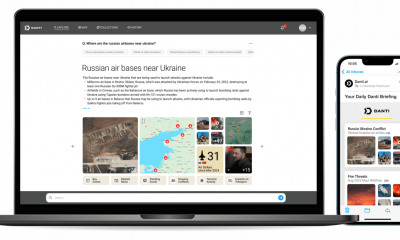Entertainment
6 things the White House is doing to reign in AI

This week, the White House scrambled to address the looming dangers and considerable opportunities of AI. In Europe, the technology has already faced significant legislative opposition(opens in a new tab), with lawmakers crafting parameters in an “AI Act.” ChatGPT was banned in Italy in March, but owner OpenAI implemented a majority of the demands placed by regulators, which prompted a lifting of the restriction(opens in a new tab) last month.
After meeting with the heads of a handful of leading generative-AI tech firms, President Biden and Vice President Harris committed to at least trying to curb AI’s potential overreach saying in a statement(opens in a new tab): “[We are] committed to doing our part – including by advancing potential new regulations and supporting new legislation – so that everyone can safely benefit from technological innovations.”
Here are the AI-related measures that the government has announced in the past few weeks:
1. The Administration’s Office of Science and Technology Policy released the “Blueprint for an AI Bill of Rights”
The Blueprint for an AI Bill of Rights(opens in a new tab) is a short set of guidelines — around 2,000 words long — that outlines the government’s stance on American’s rights to and protection from artificial intelligence. For now, the Blueprint serves as a placeholder for official legislation by filling in gaps not covered by existing laws or policies. It says that every American should be entitled to:
-
Protection from faulty or unsafe AI systems.
-
Protection from any discriminatory AI or algorithms.
-
The right to data privacy and security when dealing with AI.
-
The right to know when you are interacting with an AI system.
-
The ability to opt-out of experiences that employ AI.
To bolster transparency and trust in the federal government, the Office of Management and Budget (OMB) plans to release draft policy guidance(opens in a new tab) on the use of AI systems by the U.S. government. This will serve as a model for state and local governments, and ensure that use of AI systems by the government will protect the rights and safety of Americans.
2. Vice President Harris met with the CEOs of OpenAI, Anthropic, Microsoft, and Alphabet
On May 4, Vice President Kamala Harris and half a dozen representatives from across the administration’s tech, policy, and national security organizations met with four tech CEOs: Sam Altman of OpenAI, Dario Amodei of Anthropic, Satya Nadella, of Microsoft, and Sundar Pichai of Alphabet (Google).
According to a press release(opens in a new tab) from the White House, the meeting specifically covered:
-
“the need for businesses to be more transparent with policymakers, the public, and others about their AI systems”
-
“the importance of being able to evaluate, verify, and validate the safety, security, and efficacy of AI systems,” and…
-
“the need to ensure AI systems are secure from malicious actors and attacks.”
Biden himself dropped by to give lip service to the cause. “I just came by to say thanks,” he says in a video of the visit posted to the POTUS Twitter account. “What you’re doing has enormous potential and enormous dangers. I know you understand that. And I hope you can educate us as to what is needed to protect society, as well as to the advancement [sic]. This is really, really important.”
3. Hackers will attack major AI systems at DEF CON 31, with the White House’s blessing
The government announced this week that it will partner with AI Village(opens in a new tab) at August’s DEF CON 31 hacker convention to host a public evaluation of AI systems from Anthropic, Google, Hugging Face, Microsoft, NVIDIA, OpenAI, and Stability AI. It will be the largest-ever red teaming exercise ever conducted for any group of AI models (a “red team event” means experts will attack each platform in an attempt to find security vulnerabilities).
4. President Biden has been briefed on and has tried ChatGPT
In May 4th’s press briefing, White House Press Secretary Karine Jean-Pierre told reporters(opens in a new tab) that President Biden has been “extensively briefed” on ChatGPT and “knows how it works,” but said she has not asked for his thoughts on it. Axios reported(opens in a new tab) that “Biden himself has experimented with ChatGPT and was fascinated by the tool,” whatever that means!
5. The government is investing an additional $140 million in AI research
The National Science Foundation will invest $140 million to launch seven new National AI Research Institutes(opens in a new tab) to “pursue transformative AI advances that are ethical, trustworthy, responsible, and serve the public good” and to “bolster America’s AI R&D infrastructure and support the development of a diverse AI workforce.” The Foundation already has 18 other Institutes committed to this work. The Administration has also said that, to “shape the long-term future of trustworthy AI, with over $700 million in investments annually, the National Science Foundation continues to support AI research… into the fairness, security, safety, and trustworthiness of AI systems.”
6. The Administration shared agency-specific efforts to govern AI
The Administration outlined(opens in a new tab) additional actions being taken across the Federal government that advance the AI Bill of Rights blueprint, including:
-
The Federal Trade Commission (FTC) is looking into curbing commercial surveillance, algorithmic discrimination, and data security practices that would potentially violate section 5 of the FTC Act.
-
The Department of Education will release recommendations on the use of AI for teaching and learning by early 2023 so schools have a better understanding of how to incorporate it into curriculum.
-
The Department of Health and Human Services has proposed a rule that would prohibit discrimination by algorithms used in some clinical decision-making.
-
The United States Agency for International Development (USAID) has committed to an AI Action Plan that would shape a “global Responsible AI agenda.”
-
The Office of Management and Budget, the White House Office of Science and Technology Policy, and the Federal Chief Information Officers Council will publish examples of “non-classified and non-sensitive government AI use cases” so Americans can understand how AI is being applied (at least in non-classified ways) by the government.
-

 Entertainment6 days ago
Entertainment6 days agoWhat’s on the far side of the moon? Not darkness.
-

 Business7 days ago
Business7 days agoThoma Bravo to take UK cybersecurity company Darktrace private in $5B deal
-

 Business7 days ago
Business7 days agoHow Rubrik’s IPO paid off big for Greylock VC Asheem Chandna
-

 Business6 days ago
Business6 days agoTikTok faces a ban in the US, Tesla profits drop and healthcare data leaks
-

 Business5 days ago
Business5 days agoLondon’s first defense tech hackathon brings Ukraine war closer to the city’s startups
-

 Business7 days ago
Business7 days agoPhoto-sharing community EyeEm will license users’ photos to train AI if they don’t delete them
-

 Entertainment6 days ago
Entertainment6 days agoHow to watch ‘The Idea of You’: Release date, streaming deals
-

 Entertainment5 days ago
Entertainment5 days agoMark Zuckerberg has found a new sense of style. Why?




























